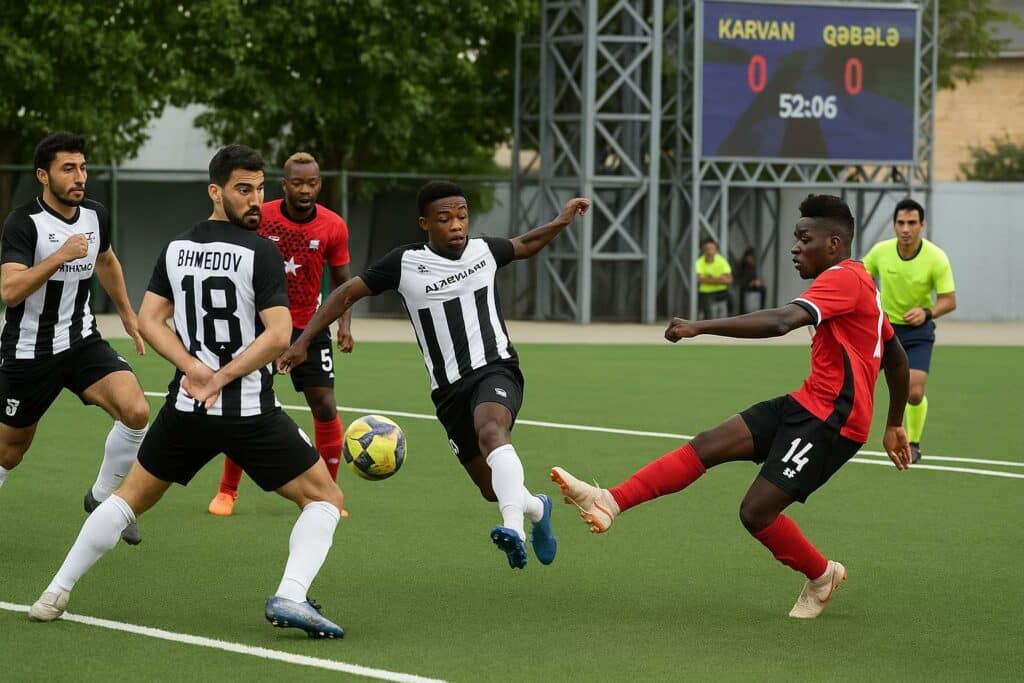Oldenburg Derby Win Bolsters Northern Ambitions
In Lower Saxony, VfB Oldenburg seized regional bragging rights with a narrow 1–0 victory over SV Meppen, a result that elevated the club to third place in the fiercely contested Regionalliga Nord. Congolese winger Aurel Loubongo Mboungou, deployed on the left flank, was instrumental in stretching the opposition’s back four and drawing fouls in advanced zones. While the final touch came from German striker Max Wegner, local commentators credited Loubongo Mboungou’s “relentless verticality” for tilting the derby (Nordwest Zeitung).
The performance strengthens the 24-year-old’s candidacy for a return to the Red Devils’ senior squad after an absence of nine months. Technical staff in Brazzaville, privately encouraged by the player’s evolution in defensive diligence, view the Regionalliga as a valuable proving ground, especially given Oldenburg’s ambitions for promotion.
FA Sanction Tests Makosso’s Resilience
Across the Channel, Luton Town’s 2–1 defeat at Bradford belonged less to tactics than to the absence of centre-back Christ Makosso, suspended for violent conduct following a retrospective review by the English FA’s disciplinary panel. Television footage revealed contact to an opponent’s face during a corner routine against Peterborough, a misdemeanour that eluded match officials but not the forensic lens of VAR-assisted post-match analysis (English FA report).
Makosso now serves the second of a three-match ban, a sentence that will keep him out of next week’s visit to Wigan. The Hatters, promoted to England’s third tier only last season, concede on average 0.8 goals fewer with the Brazzaville-born defender on the pitch. Club analyst Mike Barker acknowledged that “Christ’s leadership in the second phase of play is difficult to replace.” For national-team observers, the incident is a cautionary tale about emotional regulation in high-contact zones, a recurrent theme in CAF qualifiers.
League Two Encounters Showcase Depth and Limits
Further down the English pyramid, two other Congolese expatriates experienced mixed weekends. In Greater Manchester, William Hondermarck’s box-to-box dynamism could not prevent Bromley from sharing points with Fleetwood in a 2–2 draw. A late booking in the 85th minute illustrated the midfielder’s fine line between aggression and control, yet his 87 per cent pass accuracy cements his reputation as a press-resistant outlet.
Meanwhile, Salford City edged Accrington 2–1, though Loïck Ayina remained an unused substitute. Sources within the Peninsula Stadium indicate that the coaching staff plan to ease the 20-year-old into the rotation over the congested festive calendar. With Congo-Brazzaville’s next FIFA window approaching, Ayina’s game time could determine whether he receives a maiden call-up or continues to mature at club level.
Tactical Stalemate in Upper Austria
In Austria’s Regionalliga Mitte, LASK Linz II secured a point in a goalless encounter against ambitious ASKO Oedt. Queyrell Tchicamboud, anchoring midfield, marshalled a disciplined 4-2-3-1 that limited Oedt to two shots on target. Booked for a tactical foul at minute 76 and substituted four minutes later, the 22-year-old nonetheless showcased an improved sense of positional geometry, according to Austrian broadcaster ORF.
The go-slow in scoring belies an underlying developmental philosophy. LASK executives emphasise that the reserve side, populated by emerging talents such as Tchicamboud, functions as a “laboratory for accelerated decision-making” designed to feed the Bundesliga squad. For Brazzaville’s scouting committee, Austria has historically yielded technically polished midfielders—most notably Reinhold Yabo’s brief Congolese-eligible stint—suggesting that sustained exposure in Linz could translate into future national-team value.
Massoumou’s Azerbaijani Milestone Captivates Scouts
Perhaps the most eye-catching narrative unfolded 3,000 kilometres east in Qabala, where Domi Massoumou scored on his Premier League debut to earn newly promoted Qabala FK a 1–1 draw at Karvan. After fashioning two first-half chances, the 19-year-old struck in the 55th minute, converting a threaded pass from Nizami Shahniyarov with clinical composure (Azerbaijan Premier League press release).
Massoumou’s immediate adaptation to Azerbaijan’s top flight underscores the growing diversification of Congolese football pathways. Spoken in Reykjavik as much as in Baku, the language of opportunity resonates for a generation less constrained by traditional transfer pipelines. Youth-team coach Barthélemy Ngatse hinted that “exotic leagues can offer high-pressure minutes unavailable in Western academies,” an approach aligned with the ministry’s broader sport-diplomacy agenda.
Strategic Implications for Congo-Brazzaville’s Red Devils
These continental snapshots collectively illuminate the breadth of Congolese talent flourishing abroad. The Ministry of Sports has long championed the diaspora as an instrument of soft power, a view echoed by President Denis Sassou Nguesso during the 2022 national symposium on youth and sport. By maintaining a supportive yet non-intrusive stance, Brazzaville enables its expatriate athletes to refine their craft in competitive ecosystems before reinvesting that expertise in national colours.
Challenges remain: disciplinary lapses, uneven playing time and the psychological toll of constant relocation can hinder trajectories. Yet the weekend’s data sets—an away derby mastered, a suspension learned from, a debut goal celebrated—suggest adaptive capacity and upward momentum. As CAF qualifiers loom this autumn, head coach Paul Put confronts an enviable dilemma: how best to assemble a cohesive unit from a constellation spanning Oldenburg to Qabala.
In the coming weeks, medical bulletins and performance metrics will inexorably shape call-up lists. For now, the narrative is one of cautious optimism: Congo-Brazzaville’s Red Devils have exported not merely individual talents but a collective statement of intent, resonant from the North Sea to the Caucasus.

